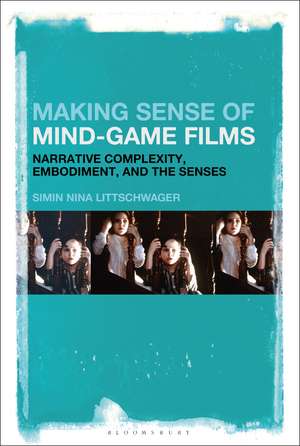Making Sense of Mind-Game Films: Narrative Complexity, Embodiment, and the Senses
Autor Dr. Simin Nina Littschwageren Limba Engleză Hardback – 26 iun 2019
| Toate formatele și edițiile | Preț | Express |
|---|---|---|
| Paperback (1) | 217.62 lei 6-8 săpt. | |
| Bloomsbury Publishing – 23 dec 2020 | 217.62 lei 6-8 săpt. | |
| Hardback (1) | 715.34 lei 6-8 săpt. | |
| Bloomsbury Publishing – 26 iun 2019 | 715.34 lei 6-8 săpt. |
Preț: 715.34 lei
Preț vechi: 1028.16 lei
-30% Nou
Puncte Express: 1073
Preț estimativ în valută:
136.90€ • 142.40$ • 113.02£
136.90€ • 142.40$ • 113.02£
Carte tipărită la comandă
Livrare economică 12-26 aprilie
Preluare comenzi: 021 569.72.76
Specificații
ISBN-13: 9781501337048
ISBN-10: 1501337041
Pagini: 256
Ilustrații: 22 bw illus
Dimensiuni: 152 x 229 mm
Greutate: 0.52 kg
Editura: Bloomsbury Publishing
Colecția Bloomsbury Academic
Locul publicării:New York, United States
ISBN-10: 1501337041
Pagini: 256
Ilustrații: 22 bw illus
Dimensiuni: 152 x 229 mm
Greutate: 0.52 kg
Editura: Bloomsbury Publishing
Colecția Bloomsbury Academic
Locul publicării:New York, United States
Caracteristici
Applies phenomenology and theories of embodied spectatorship, the most dominant paradigms of current Film Studies, to films where these theories have been considered least
Notă biografică
Simin Nina Littschwager is an independent scholar and film maker based in Wellington, New Zealand. She holds a PhD from Victoria University of Wellington, where she has previously taught undergraduate courses in film studies.
Cuprins
AcknowledgementsIntroductionChapter One: Seeing What Others Cannot SeeChapter Two: Solving Things Differently Chapter Three: Getting Lost, Sensing the WayConclusion: Play it Again: Games with the Mind or with the Body and the Senses? ReferencesList of FilmsList of Television ShowsNotesIndex
Recenzii
The originality of Littschwager's approach lies at her intersecting complexity in film and phenomenology with a focus on sensory experience and a rich stylistic analysis of the six films in the book ... An undeniably valuable addition to the scholarship on the subject of complexity in film, and is, moreover, an original contribution to film phenomenology.
Setting out to examine 'what happens with the body in the mind-game film', Simin Littschwager moves beyond existing accounts that treat such 'complex' film narratives primarily as cognitive puzzles, demonstrating instead how 'mind games' can lead into an intensified engagement with bodily experience. Deftly weaving together phenomenological concepts and detailed film analysis, Littschwager sheds new light on some of the most significant and talked-about movies of the past twenty years. It is a testament to her insight and intellectual resourcefulness that the exploration of these familiar works is so very fresh and engaging.
Among the proliferating literature on mind-game/puzzle films, Littschwager's Making Sense of Mind-Game Films impresses by its clarity of exposition and singularity of focus. Tracing what she calls 'the ruptures between body, mind and world' that mind-game films exemplify in their story worlds and embody in their affective impact, she advances our understanding beyond the cognitive challenges and narratological puzzles that other writers have highlighted.
Setting out to examine 'what happens with the body in the mind-game film', Simin Littschwager moves beyond existing accounts that treat such 'complex' film narratives primarily as cognitive puzzles, demonstrating instead how 'mind games' can lead into an intensified engagement with bodily experience. Deftly weaving together phenomenological concepts and detailed film analysis, Littschwager sheds new light on some of the most significant and talked-about movies of the past twenty years. It is a testament to her insight and intellectual resourcefulness that the exploration of these familiar works is so very fresh and engaging.
Among the proliferating literature on mind-game/puzzle films, Littschwager's Making Sense of Mind-Game Films impresses by its clarity of exposition and singularity of focus. Tracing what she calls 'the ruptures between body, mind and world' that mind-game films exemplify in their story worlds and embody in their affective impact, she advances our understanding beyond the cognitive challenges and narratological puzzles that other writers have highlighted.
